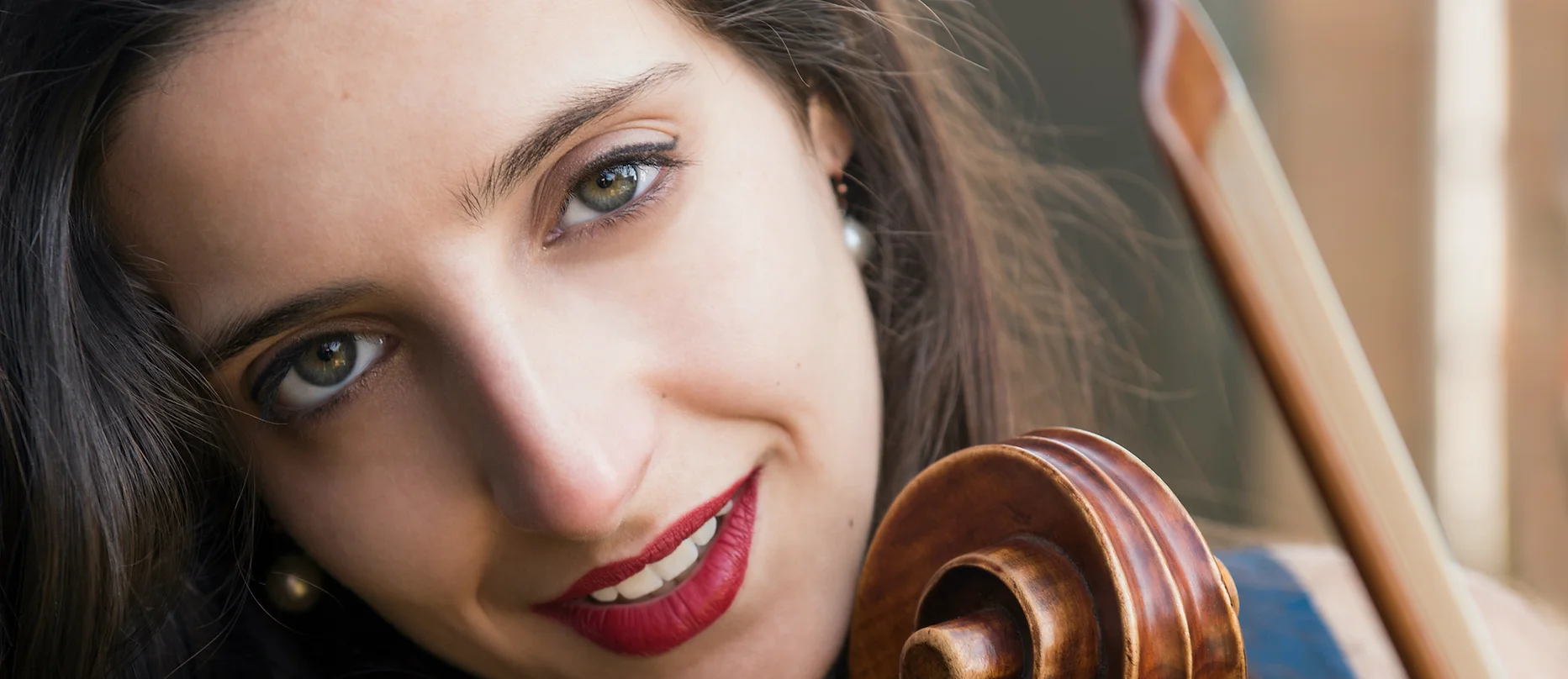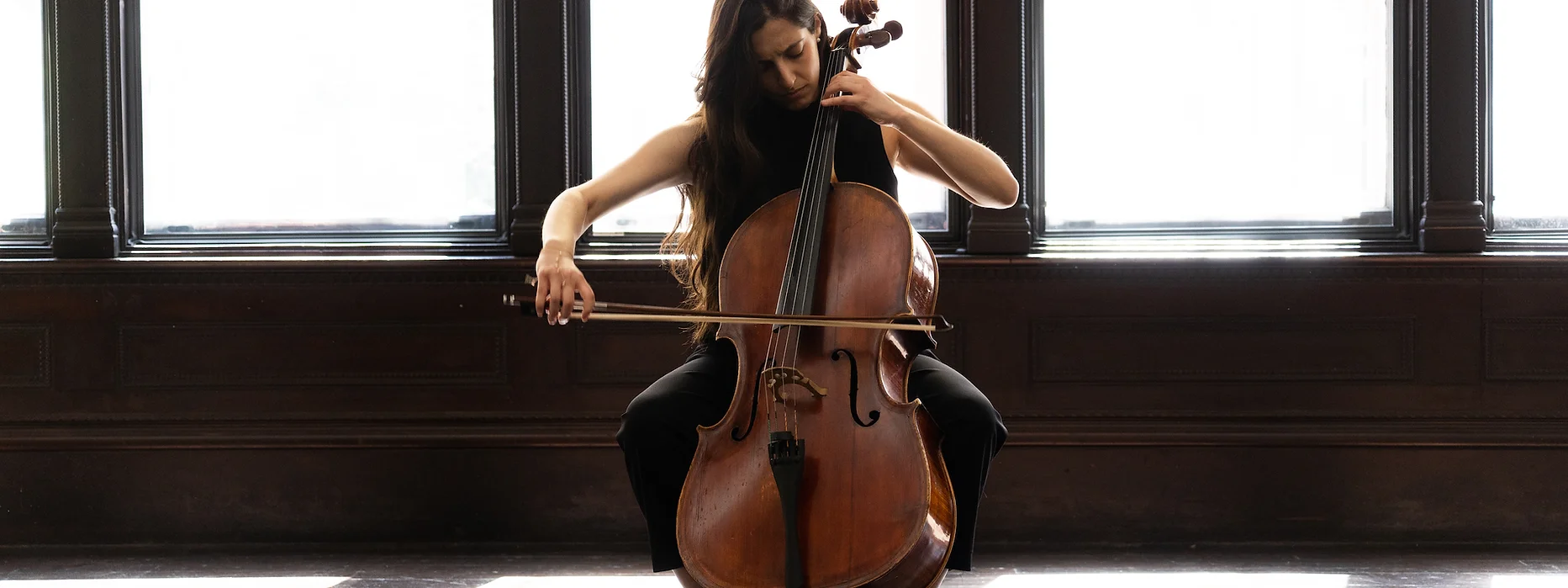Last Updated on February 28, 2024
At least in the minds of non-musicians, the cello gets unfairly pigeonholed as an instrument of classical music and little else. Of course, the cello is indeed a core instrument within the orchestra and various string ensembles, but it’s far more versatile than you might expect, and cellist Tamar Sagiv is dedicated to exploring that versatility through her unique sense of creativity and artistry.
Sagiv has earned three different degrees in classical and contemporary music, but more importantly, she’s been sharing her expertise through extensive live performances and innovative music releases.
In May of last year, Sagiv had her debut solo performance in the legendary Carnegie Hall, and she has also played shows at Lincoln Center, Alice Truly Hall, and the NYPL (New York Public Library).
In the summer of last year, Sagiv released a compelling debut album titled ‘The A Train‘. The concept behind this one was for three different composers to each write tracks for the album, and in response, Sagiv herself wrote the opening and closing tracks as a kind of commentary on the project as a whole.
She’s followed this with her recent single, ‘Free Improvisation: Hommage to J.S. Bach’, which is much more than a straight interpretation of the original work. The track features elements of free improvisation, traditionally a jazz technique, and this completely transforms the single.
During our interview, Sagiv shared the interesting story behind how this came to pass, and she discussed how her unique approach to playing is part of an ongoing journey to discover new ways to challenge and express herself through music while also letting the cello go beyond classical work.
You’ll find the full interview below.

InspirationFeed (IF): Can you tell us about your most recent single?
My latest single, titled ‘Free Improvisation: Hommage to J.S. Bach’, was released earlier this month. It came about during a recording session with my close friend and recording engineer, Hrushabh T, with whom I’ve been working for the past year.
I had originally intended to record a piece for an audition that night, but we ended up staying late in the studio to experiment. I remember improvising on the cello, and I’m not entirely sure what Hrushabh did with the microphones and setup. At that time I was working on one of Bach’s cello suites, and I think that it had a big influence on the way I improvised. What I love about free improvisation is that it’s completely spontaneous and unrehearsed, which allows for a sense of authenticity and vulnerability that you can’t achieve through practice alone.
It represents who you are at that specific moment, and you cannot hide behind practicing and polishing the music and your technique in advance. After we finished recording, I felt a strong personal connection to the piece and decided to release it as a single. I hope that listeners can connect with the emotion and sincerity that went into creating it.
IF: About how long did it take to prepare and record this particular song? And is that timeline typical for you?
The timeline for preparing and recording this particular piece was quite different from what I’m used to. Typically, I spend many hours practicing and preparing for recording sessions. I meet with my teacher to get feedback and make adjustments, play for friends and colleagues to get their opinions, and even record myself playing at home to hear how it sounds from a different perspective.
However, the recording session for this single was unique in that it took place late at night, which I believe affected my mindset and playing style. There’s something about being a little tired that makes my mind more relaxed and less conscious. It was during this session that I decided to try free improvisation, which was a departure from my usual process.
Overall, I would say that the timeline for this piece was not typical for me. It was much more spontaneous and organic than my usual approach, which involves a lot of preparation and planning. However, I think that this unconventional approach ultimately resulted in a very personal and meaningful recording.
IF: Is this single leading up to another full album release?
While I hadn’t planned on releasing a solo free improvisation piece, I am very proud of the raw and honest sound that we captured in the studio during the recording of this single. At the moment, I don’t have any immediate plans for a second album, but if and when I do decide to record one, I would love for it to be connected in some way to that same sense of authenticity.
What I appreciate about the free improvisation approach is that everything is captured in the moment, which creates a very raw and personal sound. When I do record another album, I would want it to be connected to that same sense of honesty and openness.
IF: Would you say that you tend to focus on classical, or do you prefer staying versatile in terms of genre and style?
As a classical cellist, my primary focus is always going to be within that genre. However, within classical music, there is a wide range of sub-genres and styles that one can delve into and explore. Personally, I am particularly drawn to the Romantic era, such as Brahms and Grieg, as well as 20th-century composers like Shostakovich, Ravel, and Prokofiev.
In addition, I really enjoy working with living composers and bringing their works to life. Recently, I’ve also been exploring jazz music and finding a lot of inspiration there. While I wouldn’t consider myself a jazz musician, since I don’t have formal training in that genre, I am drawn to the sophistication and complexity of jazz and have been incorporating some of those elements into my own work.
For the past few months, I’ve been working on writing a cello concerto. I fell in love with the old recordings of Duke Ellington and John Coltrane, and I decided that I want a cello concerto that will remind me of their music. The harmonies and the orchestration are completely jazzy, but my entire approach to it as a performer, from the way I phrase the melodies and the way I produce sound, is completely classical. It’s an exciting new direction for me and I am enjoying the creative challenge of blending these two musical worlds.
IF: Are there any connections between your new single and your first solo album, The A Train?
I think that working on this album was the beginning of my being more creative in my music, which led to where I am today. During the making of this album, it was the first time I composed music and it was the first time I worked with a jazz artist. The music that I composed was mainly written down, but it had some elements of improvisation as I didn’t write clear rhythms, dynamics, or tempos.
It actually made it difficult to edit the two recordings of my pieces as each take sounded different than the others. Also, many people reach out to me and ask for the sheet music for those pieces, and I’m afraid that they will be disappointed with how the music is written. It might not be the easiest thing to play from.
During the making of The A Train, I was introduced to jazz, and I believe that influence can be heard in my piece ‘Longing For’, which concludes the album. Being exposed to a variety of music and working with other composers opened up a world of possibilities for me and gave me the confidence to improvise and create my own solo single.
IF: What has the response to the single been like so far?
The response to my single has been incredibly heartwarming. I received messages from people all around the world. One message, in particular, stood out: a cello teacher from Brazil reached out to share how the political crisis in his country had impacted his students, causing some to lose their motivation to attend their cello lessons. After sharing my single with them, two of his students decided to return to their cello studies, which was the best gift I could ask for.
It’s amazing to see how music can have such a positive impact on people’s lives. Another message I received was from someone who hoped that I would find inspiration in improvising happier music. At first, I felt compelled to apologize, but then I realized that free improvisation is about being true to oneself and expressing oneself in the moment. This is part of free improvisation, to bring yourself as you are, and that was what I was in that moment.
IF: Do you also tend to play your singles live? Is that a way to reveal new songs you’ll be recording?
While I haven’t recorded my new pieces yet, I do enjoy playing them during my concerts. As a new composer, it’s fascinating to witness the audience’s reaction to my music and to experience performing it live.
One of the most memorable moments was during the Cello Biennale Festival in Amsterdam last October, which is one of the most significant cello events worldwide. The Dutch audience was incredibly candid, and many of them approached me after the performance to share their thoughts, which gave me a tremendous boost of confidence in the piece I performed, ‘Roots’. Since then, I have played ‘Roots’ at various concerts in the US, and I’m planning to include it in my upcoming performances in New York City. However, I haven’t felt that it’s the appropriate time to record it just yet. Despite it not being a long piece, around five minutes, It feels like a substantial composition, and I haven’t made up my mind whether it should be a single or part of an album.
IF: Can you tell us what the next single might be?
To be honest, I’m not entirely sure what my next single will be. It could be another free-improvisation that I record spontaneously in the middle of the night, or it might be a recorded version of my piece ‘Roots’. Sometimes, I release singles without any prior planning because it just feels like the right thing to do.
Right now, I’m preoccupied with my upcoming concerts for the next couple of months, so I haven’t had a chance to compose anything new. However, I’m looking forward to brainstorming and exploring some new ideas for my next release. I’m particularly interested in experimenting with electronics to create something truly unique and compelling.

